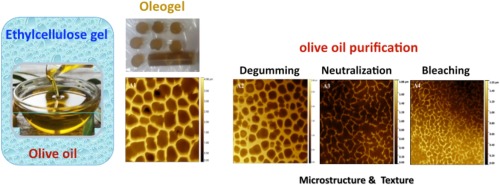当前位置:
X-MOL 学术
›
Food Hydrocoll.
›
论文详情
Our official English website, www.x-mol.net, welcomes your
feedback! (Note: you will need to create a separate account there.)
Ethylcelluse oleogels with extravirgin olive oil: the role of oil minor components on microstructure and mechanical strength
Food Hydrocolloids ( IF 11.0 ) Pub Date : 2018-11-01 , DOI: 10.1016/j.foodhyd.2018.05.030 V. Giacintucci , C.D. Di Mattia , G. Sacchetti , F. Flamminii , A.J. Gravelle , B. Baylis , J.R. Dutcher , A.G. Marangoni , P. Pittia
Food Hydrocolloids ( IF 11.0 ) Pub Date : 2018-11-01 , DOI: 10.1016/j.foodhyd.2018.05.030 V. Giacintucci , C.D. Di Mattia , G. Sacchetti , F. Flamminii , A.J. Gravelle , B. Baylis , J.R. Dutcher , A.G. Marangoni , P. Pittia

|
Abstract The structuring of Extra Virgin Olive Oil with ethylcellulose and the role of oil minor compounds on oleogel structural and mechanical properties were investigated. To this aim a refining process, consisting of degumming, neutralization and bleaching steps, was applied to the oils to progressively remove specific minor components. At each step, the oils were characterized by free fatty acids and polyphenol contents, primary and secondary oxidation products and polarity of the solvent; the purified oils were then used to produce ethylcellulose-based oleogels. Large deformation tests such as Back Extrusion and Two Plates Compression Analysis were performed to investigate the mechanical properties of the oleogels, while the microstructure was studied by Atomic Force Microscopy. Results showed that the purification steps affected the chemical composition of the oils and their polarity which, in turn, influenced oleogel properties. From a microstructural perspective, a change in the size, diameter and shape of the pores in the gels produced with the purified oils was observed. Pore roundness and circularity decreased throughout the purification, with a progressive loss in roundness and circularity and a predominance of elongated and bean-shaped pores as minor compounds were selectively removed from the matrix. A decreasing trend in gel hardness was observed upon oil refining showing that minor compounds significantly affected also the mechanical properties of the oleogels. The polarity of the solvent and the presence of minor components were confirmed to be important parameters to determine the relation between ethylcellulose network characteristics and oleogel mechanical strength. From a multiple partial least regression MPLSR, it resulted that pores diameter, roundness and circularity were positively affected by polar and amphiphilic compounds like polyphenols while gel hardness was positively influenced by free fatty acids and total polar compounds.
中文翻译:

含有特级初榨橄榄油的乙基纤维素油凝胶:油微量组分对微观结构和机械强度的影响
摘要 研究了特级初榨橄榄油与乙基纤维素的结构以及油微量化合物对油凝胶结构和机械性能的影响。为此,对油进行了精炼过程,包括脱胶、中和和漂白步骤,以逐步去除特定的微量成分。在每一步,油的特征在于游离脂肪酸和多酚含量、初级和次级氧化产物以及溶剂的极性;然后将纯化的油用于生产基于乙基纤维素的油凝胶。进行了大变形试验,如反向挤压和两板压缩分析,以研究油凝胶的机械性能,同时通过原子力显微镜研究微观结构。结果表明,纯化步骤会影响油的化学成分及其极性,进而影响油凝胶的性质。从微观结构的角度来看,观察到用纯化油生产的凝胶中孔的大小、直径和形状发生了变化。孔圆度和圆形度在整个纯化过程中降低,圆度和圆形度逐渐降低,细长和豆形孔占优势,因为少量化合物被选择性地从基质中去除。在炼油过程中观察到凝胶硬度的下降趋势,表明微量化合物也显着影响了油凝胶的机械性能。溶剂的极性和微量组分的存在被证实是确定乙基纤维素网络特性和油凝胶机械强度之间关系的重要参数。从多元偏最小回归 MPLSR 中,极性和两亲性化合物如多酚对孔径、圆度和圆形度有积极影响,而凝胶硬度受游离脂肪酸和总极性化合物有积极影响。
更新日期:2018-11-01
中文翻译:

含有特级初榨橄榄油的乙基纤维素油凝胶:油微量组分对微观结构和机械强度的影响
摘要 研究了特级初榨橄榄油与乙基纤维素的结构以及油微量化合物对油凝胶结构和机械性能的影响。为此,对油进行了精炼过程,包括脱胶、中和和漂白步骤,以逐步去除特定的微量成分。在每一步,油的特征在于游离脂肪酸和多酚含量、初级和次级氧化产物以及溶剂的极性;然后将纯化的油用于生产基于乙基纤维素的油凝胶。进行了大变形试验,如反向挤压和两板压缩分析,以研究油凝胶的机械性能,同时通过原子力显微镜研究微观结构。结果表明,纯化步骤会影响油的化学成分及其极性,进而影响油凝胶的性质。从微观结构的角度来看,观察到用纯化油生产的凝胶中孔的大小、直径和形状发生了变化。孔圆度和圆形度在整个纯化过程中降低,圆度和圆形度逐渐降低,细长和豆形孔占优势,因为少量化合物被选择性地从基质中去除。在炼油过程中观察到凝胶硬度的下降趋势,表明微量化合物也显着影响了油凝胶的机械性能。溶剂的极性和微量组分的存在被证实是确定乙基纤维素网络特性和油凝胶机械强度之间关系的重要参数。从多元偏最小回归 MPLSR 中,极性和两亲性化合物如多酚对孔径、圆度和圆形度有积极影响,而凝胶硬度受游离脂肪酸和总极性化合物有积极影响。











































 京公网安备 11010802027423号
京公网安备 11010802027423号